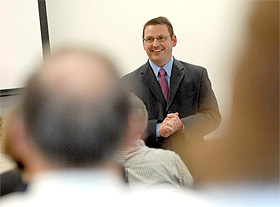News Archives - 2008
MAL Colloquium features student research
 The Master of Arts in Leadership 2008 Spring Colloquium was held on Wednesday, June 4 in the Oren Gateway Center. Students presented overviews of their final project research to students, faculty, and guests.
The Master of Arts in Leadership 2008 Spring Colloquium was held on Wednesday, June 4 in the Oren Gateway Center. Students presented overviews of their final project research to students, faculty, and guests.
At or near the completion of the course work for the Master of Arts in Leadership (MAL), students are required to develop and carry out an in-depth study of some aspect of leadership or a leadership-related topic. This study affords the student the opportunity to connect an issue or problem with what has been learned in the course work and course-related activities.
MAL student David Limberg focused his research on the model of servant leadership and its relationship to military professionals. The servant leadership theory was pioneered by Robert Greenleaf and explained in his book, "The Servant Leader." It is based on the principle that in order to lead, one must be able to serve.
Limberg received his bachelor's degree at West Point and served in the United States Army for nine years. "I learned a lot about leadership in the Army but never really read or heard about servant leadership," he said. Upon reflecting on his military experience, he determined that qualities like being empathetic, listening, and caring about those we lead could be found in military leadership.
For his research project, Limberg reviewed military leadership doctrine and conducted interviews with military professionals who had been serving for ten years or more. Through the interview process, he discovered that the servant leadership model is reflected in how officers interact with their subordinates and what they do to demonstrate that they are worthy of being their leader. "They didn't tell me they are being a servant leader, but they told me they went out of their way to help this soldier and take care of them," he said.
In his presentation at this month's colloquium, Limberg addressed the stereotypes that can accompany concepts of military leaders. "If you can find connections in the military, an organization that is often known for taking land and taking over, then you can find it in your own workplace," said Limberg. "There are people out there who are doing amazing things for the small group they lead or their individual organizations. They are demonstrating that they care about the people who work for them, above and beyond what is expected, and they listen. People respond to leaders who care about them, are honest, and have integrity."
2008 MAL Colloquium presenters:
-- Mohamed Abdinur, "The Dynamics of Immigrant Remittance: The Somali Case"
-- Cuthbert Fernandez, "Analysis of Mahatma Gandhi and His Leadership Style"
-- Shane Horihan, "Leadership As It Relates to Employee Performance"
-- Joanne Johnson, "Effects of an Increase in Email Communications in the Workplace and, Due to Its Ineffectiveness as a Communication Medium, Why It Will -- Become Extinct for Business Communications"
-- Jennifer Kvidt, "The Effects of Performance-Focused Training on Learning Transfer"
-- Amy Lamparske, "Best Leadership Practices in Global/International Business"
-- Andrew Langins, "Paradoxical Leadership: The Rise and Fall of Richard Nixon"
-- David Limberg, "Servant Leadership and the Military Professional: How Do Military Professionals Practice Servant Leadership in the Conduct of Their Lives as Leaders?"
-- Jonathan Olson, "Characteristics of Charismatic Leaders Who Have Led Their Followers Astray"
-- Timothy Roddy, "Observations of the Behavior and Practices of Leaders of Christian Value-Led Companies"
-- Alicia Schwarz, "Leadership and Youth Mentoring"
-- Alicia Smith, "The Role of Black Women in the Civil Rights Movement"
-- Bangalee Trawally, "Nelson Mandela the Transformational Leader: The Struggle for Social Justice, Equality and Democratic Change in South Africa"
-- Elizabeth Walker, "Computerized Provider Order Entry Implementation: Provider Leadership Key to Success
"